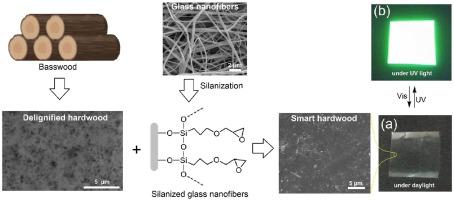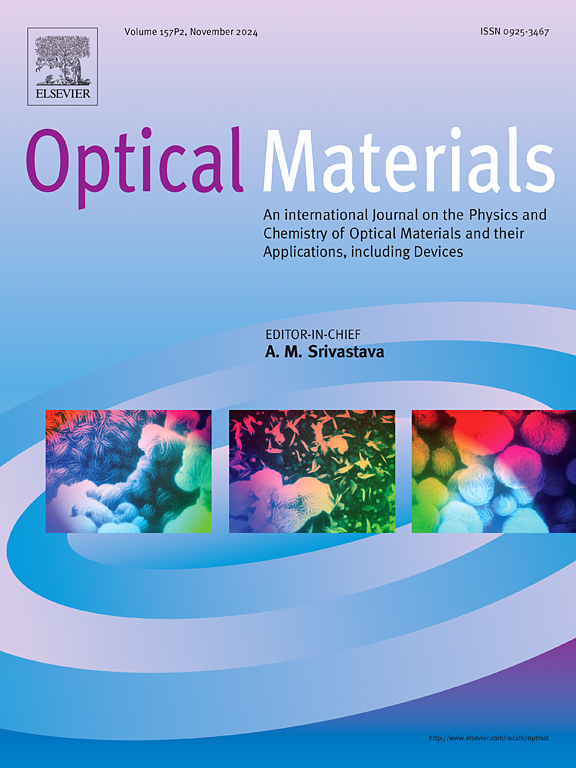Infiltration of glass nanofiber-reinforced polylactic acid into delignified hardwood toward photoluminescent and mechanically reliable smart windows
IF 3.8
3区 材料科学
Q2 MATERIALS SCIENCE, MULTIDISCIPLINARY
引用次数: 0
Abstract
Ultraviolet-protective, mechanically reliable, and photoresponsive wood that can switch color under ultraviolet light was developed. A combination of alkaline earth-doped strontium aluminate (ASA) as a photoluminescent pigment and glass nanofiber-supported polylactic acid as a hosting agent was infused into a delignified wood, producing transparent wood with photochromic activity. The ASA phosphor has proven high thermal stability and photostability. A typical process for producing colorless photoluminescent wood includes the well-dispersion of ASA in glass nanofiber-supported polylactic acid without agglomeration. As proven by the coloration measurements, the current photoluminescent wood becomes green under ultraviolet light and remains transparent under daylight. Transmission electron microscopy (TEM) and scanning electron microscope (SEM) were employed to determine the morphology of the phosphor particles and glass fibers, demonstrating sizes of 12–21 nm and 50–125 nm, respectively. The luminescent wooden samples were studied by numerous microscopic and spectroscopic techniques, including SEM, X-ray fluorescence (XRF), and energy-dispersive X-ray (EDX). Upon excitation at 365 nm, the luminescence wood demonstrated an emission peak at 518 nm. When increasing the ASA concentration, the photoluminescent hardwoods displayed improved ultraviolet protection and better water resistance. The responsiveness of the luminescent wood to UV irradiation was fast and reversible.

将玻璃纳米纤维增强聚乳酸渗入木质素硬木,实现光致发光和机械可靠的智能窗户
开发出了在紫外线照射下可变色的防紫外线、机械可靠且具有光致发光性的木材。将掺杂碱土的铝酸锶(ASA)作为光致发光颜料,将玻璃纳米纤维支撑的聚乳酸作为宿主剂,注入到脱木素木材中,生产出具有光致变色活性的透明木材。事实证明,ASA 荧光粉具有很高的热稳定性和光稳定性。生产无色光致发光木材的典型工艺包括将 ASA 充分分散在玻璃纳米纤维支撑的聚乳酸中,且不产生团聚。经着色测量证明,目前的光致发光木材在紫外线下呈绿色,在日光下保持透明。利用透射电子显微镜(TEM)和扫描电子显微镜(SEM)测定了荧光粉颗粒和玻璃纤维的形态,其尺寸分别为 12-21 纳米和 50-125 纳米。通过多种显微镜和光谱技术,包括扫描电镜、X 射线荧光 (XRF) 和能量色散 X 射线 (EDX),对发光木质样品进行了研究。在 365 纳米波长的激发下,发光木材在 518 纳米波长处显示出发射峰。当 ASA 浓度增加时,光致发光硬木的紫外线防护性能和防水性能都有所提高。发光木材对紫外线照射的反应速度快且可逆。
本文章由计算机程序翻译,如有差异,请以英文原文为准。
求助全文
约1分钟内获得全文
求助全文
来源期刊

Optical Materials
工程技术-材料科学:综合
CiteScore
6.60
自引率
12.80%
发文量
1265
审稿时长
38 days
期刊介绍:
Optical Materials has an open access mirror journal Optical Materials: X, sharing the same aims and scope, editorial team, submission system and rigorous peer review.
The purpose of Optical Materials is to provide a means of communication and technology transfer between researchers who are interested in materials for potential device applications. The journal publishes original papers and review articles on the design, synthesis, characterisation and applications of optical materials.
OPTICAL MATERIALS focuses on:
• Optical Properties of Material Systems;
• The Materials Aspects of Optical Phenomena;
• The Materials Aspects of Devices and Applications.
Authors can submit separate research elements describing their data to Data in Brief and methods to Methods X.
 求助内容:
求助内容: 应助结果提醒方式:
应助结果提醒方式:


